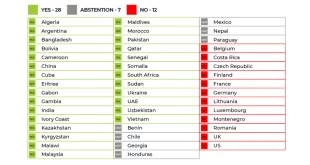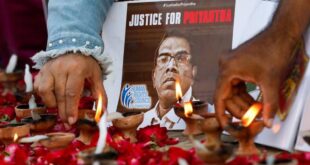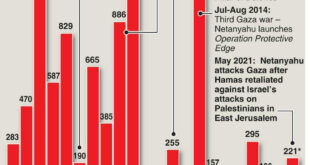 UNITED NATIONS, Sep 14, 2011 (IPS) – When a landmark world conference against racism adopted a historic political declaration in the South African port city of Durban back in 2001, the 62-page document covered virtually every conceivable act of racism, xenophobia and racial intolerance worldwide.
UNITED NATIONS, Sep 14, 2011 (IPS) – When a landmark world conference against racism adopted a historic political declaration in the South African port city of Durban back in 2001, the 62-page document covered virtually every conceivable act of racism, xenophobia and racial intolerance worldwide.
The Durban Declaration and Programme of Action (DDPA) identified discrimination of all political stripes, including against ethnic minorities, indigenous peoples, women, refugees, migrants, Africans and Afro-Americans.
But the spark that ignited a firestorm of criticism from Israel and Western states was about the "plight of the Palestinian people under foreign occupation".
"We recognize the inalienable right of the Palestinian people to self- determination and to the establishment of an independent State, and we recognize the right to security for all States in the region, including Israel, and call upon all States to support the peace process and bring it to an early conclusion," it said.
Not even the assurance of security to the Jewish state could dampen the protests from Israel.
The Durban conference was also dubbed as being anti-Semitic when it clearly declared: "We recall that the Holocaust must never be forgotten," and "We recognize with deep concern the increase in anti- Semitism and Islamophobia in various parts of the world…"
A review conference in Geneva in 2009 "reaffirmed" the Durban Declaration and Programme of Action, sparking more protests from Israel and its Western supporters.
A third review conference (Durban III) – commemorating the 10th anniversary of the DDPA and scheduled to take place Sep. 22 – is expected to adopt a political declaration, which once again "reaffirms" the DDPA as "a comprehensive United Nations framework and solid foundation for combating racism, racial discrimination, xenophobia and related intolerance".
The two-page draft declaration – finalised last week by member states and developed through a negotiating process coordinated by the outgoing president of the General Assembly, Joseph Deiss – will be forwarded to the high-level meeting next week for approval and adoption.
As things stand, it is very unlikely the draft political agreement, which will also reaffirm the original Durban declaration for a Palestinian homeland, will undergo any radical changes.
But it could be put to a vote, with Israel and Western states losing out in a 193-member General Assembly which is overwhelmingly pro- Palestinian.
Jan Lonn, secretary of the World Against Racism Network, told IPS the agreement reached last week on the "reaffirmation" and "full implementation" of the Durban Declaration and Programme of Action is a defeat for the anti-Durban campaign and a victory for all victims of racism whose rights are protected by the DDPA.
"We are now launching a campaign for states to be represented at the highest level at the Durban +10 session next week to ensure its success," he added.
Unfortunately, he said, both the U.N. secretariat and Deiss's office have "discouraged high-level representation by not implementing the decisions of the General Assembly".
In a statement released last month, Deiss said "the high level meeting is an important opportunity for member States to renew their common political will towards eradicating racism, racial discrimination, xenophobia and related intolerance."
This is a critical challenge the family of nations should address with intensified effort and renewed commitment, he added.
Lonn said the office of the new president of the General Assembly, Ambassador Nassir Abdulaziz al-Nasser of Qatar, "is supportive" of the high-level meeting "but has only a very short time-frame to do the needful to ensure its success."
Secretary-General Ban Ki-moon is also hosting a nuclear security summit on the same day as the high-level meeting on racism, triggering protests from non-governmental organisations (NGOs).
Lonn said, "The great challenge after this high-level session will be to communicate the truth and the facts on the DDPA as the most comprehensive U.N. programme to combat racism and correct all the widespread disinformation."
"We call for universalising adherence to the DDPA and for boycotting states to join in the global efforts against racism," he added.
Several Western states, including Canada, Germany, the United States, Italy, Austria, the Netherlands, the Czech Republic and Austria have indicated they will not participate in the meeting.
The boycott is the result of an intense campaign by Israel which has branded the meeting "anti-Semitic" even before it could get off the ground.
Still, an overwhelming majority of the U.N.'s member states – along with dozens of human rights activists and NGOs – are expected to actively participate in the meeting.
Roger Wareham, who represents the International Secretariat of the December 12th Movement and the International Association Against Torture, both of which have been heavily involved with the racism conference since its inception, has strong feelings about the upcoming meeting.
He told IPS the proclamation adopted last week "is indeed a reaffirmation of the DDPA and a significant victory for those of us whose constituencies represent the vast majority of humankind."
The unstated but key issue around the DDPA has always been the declaration of the Trans-Atlantic Slave Trade and Slavery as Crimes against Humanity, he added.
"The Western countries opposed this language then, and have tried to make it disappear since, because it sets the foundation for an internationally-recognised legal basis for reparations for the descendants of the victims of these crimes," he said.
"I am not concerned by a proposed boycott of Western nations. The Western nations boycott because they are indeed the criminals involved here," said Wareham.
"We have been working with the United Nations since 1989," he said, pointing out that one of the underlying issues in the human rights field has always been the "double standard applied by and to the Western European and Other Group (WEOG) at the United Nations".
It is far better to have a proclamation of principle than a watered- down meaningless statement of consensus, he added.
"We hope that there will be no attempts by the WEOG to revise this language but we remain ever vigilant," Wareham said.
In any case, he noted, "we will continue to organise people of African descent to struggle for our historically justifiable demand for reparations."
 Sri lanka Muslims Web Portal Diversity and Inclusiveness
Sri lanka Muslims Web Portal Diversity and Inclusiveness



